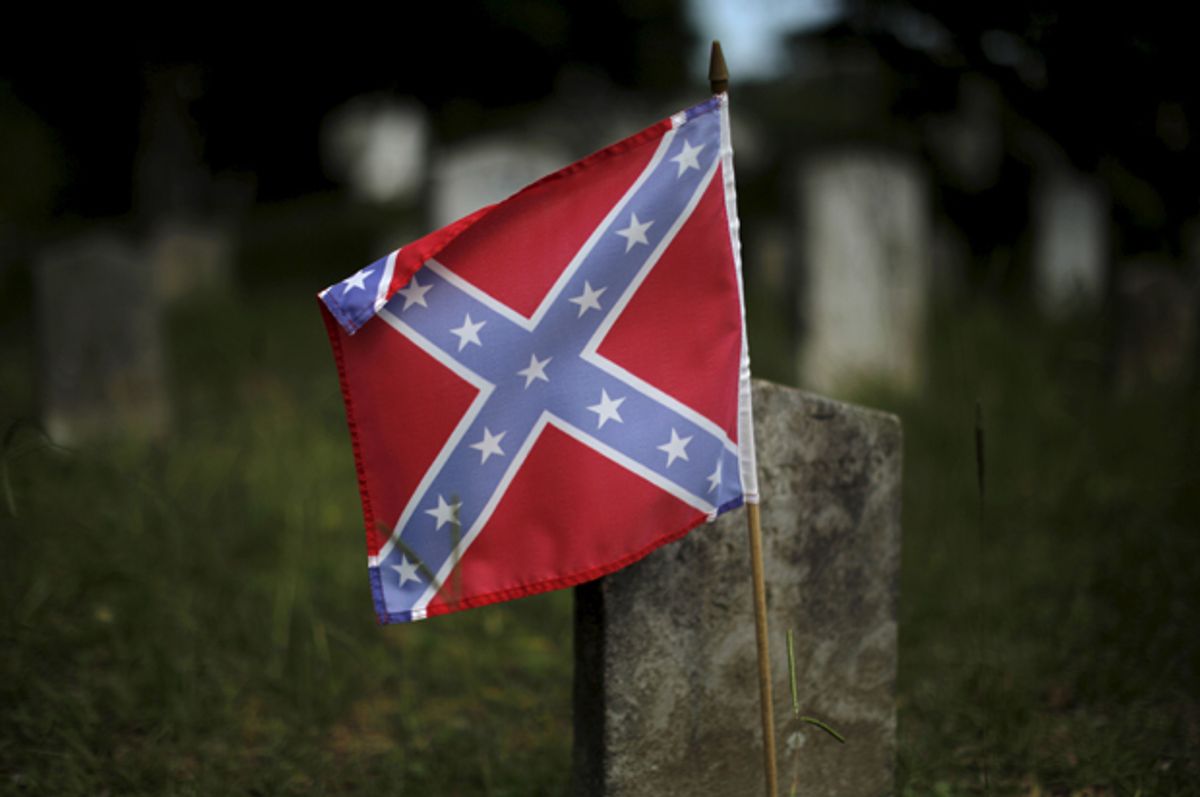 Lovers of the Confederacy, we've got some bad news for you. But there's some good news, too.
Lovers of the Confederacy, we've got some bad news for you. But there's some good news, too.
Here's the bad news for people who wish to honor a secessionist army that killed and died for the right to own other human beings: The South Carolina House voted early Thursday morning to remove the Confederate battle flag from South Carolina State House grounds. Republican Gov. Nikki Haley has promised to sign the bill.
But there's also good news for Americans who wish to remember traitorous champions of slavery: There are still 10 US Army bases in the United States named for Confederate generals, and military officials have no plans to change the names.
South Carolina's momentous decision to remove the Confederate flag came three weeks after Dylann Roof, a young white supremacist who appeared in several photographs holding the Confederate flag, shot and killed 9 African American parishioners at a historic black church in Charleston, South Carolina. Many people were outraged when a photograph taken at the state house showed the American flag flying at half-staff in mourning while the Confederate flag continued to fly at full-staff.
The mass shooting led to an aggressive and effective backlash against the continued presence of Confederate battle flags in American society. Major retailers — including Wal-Mart, Amazon, eBay, and Sears — announced they'd stop selling the flags. Officials in Virginia, Maryland, North Carolina, and Tennessee promised it would no longer be allowed on license plates.
More from GlobalPost: Turns out people get angry when you say white Americans are terrorists, too
Other symbols of the Confederacy are also being targeted. Alaska just changed a census area named for a Confederate general and plantation owner. In Tennessee there's been a bipartisan call to remove from the state house a bust of Nathan Bedford Forrest, a Confederate general and leading figure in the Ku Klux Klan. And folks are beginning to talk about the fact that the US Capitol's National Statuary Hall Collection features many Confederate leaders, including President of the Confederacy Jefferson Davis.
There's definitely a national conversation happening around symbols of the Confederacy.
The Pentagon is staying out of it.
While the Confederate flag is falling in South Carolina — an act whose symbolic importance can't be overstated — US Army soldiers continue to train at bases named for Confederate leaders that waged civil war against the Union Army, which, you'll recall, included the US Army:
- Fort Lee (Virginia)
- Fort Hood
- Fort Benning (Georgia)
- Fort Gordon (Georgia)
- Fort Bragg (North Carolina)
- Fort Polk (Louisiana)
- Fort Pickett (Virginia)
- Fort A.P. Hill (Virginia)
- Fort Rucker (Alabama)
- Camp Beuregard (Louisiana)
There are no plans to change the names, according the military officials.
“Every Army installation is named for a soldier who holds a place in our military history,” Brigadier General Malcolm Frost, the United States Army's head spokesperson, said. “Accordingly, these historic names represent individuals, not causes or ideologies. It should be noted that the naming occurred in the spirit of reconciliation, not division.”
Renaming the bases would be a major symbolic act, much like South Carolina's decision to take down the flag. But it would still just be the beginning of stripping away Confederate symbolism from government property. Countless roads, bridges, schools, monuments, parks, and buildings in the United States honor Confederate leaders.
"There are thousands — I'm not sure it's possible to know how many — [of] places in America that honor the Confederacy," Maureen Costello of Southern Poverty Law Center told CNN. "When we name these places — or we don't change the names of places that have been around for years — we allow white America to send a message to black America: 'Not only do we deny your experience, but we're going to celebrate the people who celebrated your oppression.'"
There is one "fort" named for a Confederate general that might (but probably won't) be undergoing a name-change soon: Fort Bragg, a coastal city in Mendocino County, California, which was founded as a military garrison in 1857.
Like Fort Bragg in North Carolina, it was named for Braxton Bragg. The big difference? When California's Fort Bragg got its name, the South hadn't seceded yet and Bragg hadn't defected to the Confederate army. So while the town's name still honors Bragg, you can't say it was named to honor Confederate General Bragg. That detail might save it from new rules proposed by California Senate Bill 539, which would ban and expunge from state property the names of people "associated" with the Confederacy.
It's a different story in North Carolina.
That US Army base there was established as Camp Bragg in 1918. More than half a century earlier, Bragg oversaw the killing of US Army soldiers.
Someday, perhaps, Fort Bragg's name will seem as distasteful as the flag that will soon disappear from the South Carolina State House, and people will ask why it took the US Army so long to change.



Shares